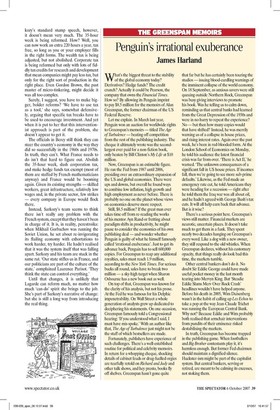Penguin's irrational exuberance
James Harland what's the biggest threat to the stability of the global economy today? Derivatives? Hedge funds? The credit crunch? Actually it could be Pearson, the company that owns the Financial Times. How so? By allowing its Penguin imprint to pay $8.5 million for the memoirs of Alan Greenspan, the former chairman of the US Federal Reserve.
Let me explain. In March last year, Penguin won an auction for worldwide rights to Greenspan's memoirs — titled The Age of Turbulence — beating off competition from the rest of the publishing industry. The cheque it ultimately wrote was the secondlargest ever paid for a non-fiction book, only beaten by Bill Clinton's My Life at $10 million Now, Greenspan is an estimable figure. He ran the Fed from 1987 until 2006, presiding over an extraordinary expansion of the US and global economies. There were ups and downs, but overall he found ways to combine low inflation, high growth and high employment as never before. There is probably no one on the planet whose views on economics deserve more respect.
Still, $8.5 million? If the great man ever takes time off from re-reading the works of his mentor Ayn Rand or fretting about paradigm shifts in productivity, he might pause to consider the economics of his own publishing deal — and wonder whether Penguin is guilty of what he himself famously called 'irrational exuberance'. Just to get its advance back, Penguin has to sell 600,000 copies. For Greenspan to reap any additional royalties, sales must reach 1.9 million, according to the New York Times. For serious bucks all round, sales have to break two million — a sky-high target when Sharon Osbourne has a new book out as well.
On top of that, Greenspan was known for the clarity of his analysis, but not his prose. At the Fed he was famous for his Delphic impenetrability. On Wall Street a whole generation of analysts grew up dedicated to deciphering his statements. On one occasion, Greenspan famously told a Congressional hearing: 'If you understood what I said, I must have mis-spoke.' With an author like that, The Age of Turbulence just might not be the stuff of which bestsellers are made.
Fortunately, publishers have experience of such challenges. There's a well-established routine for political and celebrity memoirs. In return for a whopping cheque, shocking details of cabinet feuds or drug-fuelled orgies are tearfully retold on Richard and Judy and other talk shows, and hey presto, books fly off shelves. Greenspan hasn't gone quite that far but he has certainly been touring the studios — issuing blood-curdling warnings of the imminent collapse of the world economy. On 18 September, as anxious savers were still queuing outside Northern Rock, Greenspan was busy giving interviews to promote his book. Was he telling us to calm down, reminding us that central banks had learned from the Great Depression of the 1930s and were in no hurry to repeat the experience? No — but then how many copies would that have shifted? Instead, he was merrily warning us of a collapse in house prices, and rising interest rates. Again over the past week, he's been in red-blooded form. At the London School of Economics on Monday, he told his audience the latest financial crisis was far from over. 'There is Act II,' he warned. 'The unknown consequences of a significant fall in US house prices. If incomes fall, then we're going to see more sub-prime defaults.' Likewise, as the Fed made an emergency rate cut, he told Americans they were heading for a recession — right after he told them the Iraq war was all about oil, and he hadn't agreed with George Bush's tax cuts. It will all help earn back that advance. But is it wise?
There's a serious point here. Greenspan's views still matter. Financial markets are neurotic, uncertain places. It doesn't take much to get them in a funk. They spent nearly two decades hanging on Greenspan's every word. Like a dog with a new owner, they still respond to the old whistles. When Greenspan declares, without his customary opacity, that things really do look bad this time, the markets tumble.
Other central bankers don't do it. No doubt Sir Eddie George could have made useful pocket money in the last month tearing into Mervyn King. But `Steadie Eddie Slams Mew Over Rock Crash' headlines wouldn't have helped anyone. Before his death in 2005, Wim Duisenberg wasn't in the habit of calling up Les Echos to take a pop at the way Jean-Claude Trichet was running the European Central Bank. Why not? Because Eddie and Wim probably both realised that armchair interventions from pundits of their eminence risked destabilising the markets.
In truth, Greenspan has become trapped in the publishing game. When footballers and Big Brother contestants play it, it's harmless enough. But former Fed chairmen should maintain a dignified silence. Huckster-ism might be part of the capitalist system. But central bankers, serving or retired, are meant to be calming its excesses, not stoking them.





























































 Previous page
Previous page